The Solemnity of Christ the King gives us a wonderful opportunity to speak about a king, and a Christian king at that. I’m referring to Vladimir (ruled 980-1015 AD), the first Christian king of what was known as the Kievan Rus’, the ancient territory of the Slavic peoples of ethnic Russian and Ukrainian origin. (Rus’ is a 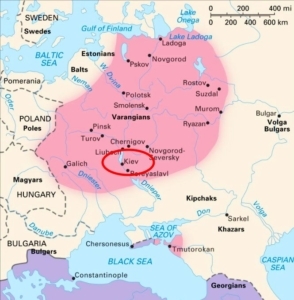 transliteration from the Russian Русь, which explains the apostrophe.) The kingdom was named Kievan because Kiev was its capital city.
transliteration from the Russian Русь, which explains the apostrophe.) The kingdom was named Kievan because Kiev was its capital city.
Yes, once these two cultures were a single, united people under a Christian ruler, and we must pray for that peace and unity to be restored to the entire region once again.
Vladimir is known as the Grand Prince of Kiev and was baptized in 988, an event that sent shockwaves throughout the whole known world at the time. But before I get to the story of his conversion, let’s put this great event in its proper historical context.
The “Dark” Ages
What is often termed The Dark Ages by historians is only dark when you look at it with secular eyes. The period encompasses roughly the five centuries that followed the Fall of the Roman Empire (476 AD). The “darkness” of it refers to the cultural and political vacuum that ensued in every area of the world where the old Roman administrative structure ceased to function.
But that same five century period was also like a massive door opening allowing the light of Christ to spread into the barbarian nations of Europe, and that is why no Christian can actually call this a truly dark period. In the matter of the salvation of souls it was a nuclear fireball of epic proportions.
I have noted in past newsletters some of the missionary activity that took place during those centuries (St. Columban in Ireland, France, and Italy; St. Boniface in Germany; Sts. Cyril and Methodius in Eastern Europe). It’s hard to imagine a more fruitful missionary period for the spread of Christ’s Gospel. The addition of the whole Kievan Rus’ to Christendom at the end of the 10th century is a significant part of that story.
Soap Opera or Providence?
Vladimir’s conversion story has a bit of a soap opera quality to it. Many historians believe that the Christianization of the Rus’ began centuries before he came on the scene. In his desire to consolidate power and create an empire, Vladimir nurtured a certain cult of himself as the “first Christian king” of the Rus’ with the conversion of the whole people to follow in his wake. It seems that old Vladimir may have even engaged in a little KGB-style tactics by – ahem – suppressing some of the documentary evidence of the pre-Vladimirian Christianization of his people.
As the Book of Ecclesiastes would say: “There is nothing new under the sun” (Eccl 1:9).
The story is not verified, just suggested by those who know Slavic history well, but it is entirely plausible as a political calculation (remember he was a pagan and leader of a barbarian nation at this point). And it gets better.
Images via Pixabay, Britannica (map), and Wikimedia Commons: St. Olga, Moscow monument, Kiev Monument, Baptism.
Monument to Vladimir the Great – Moscow
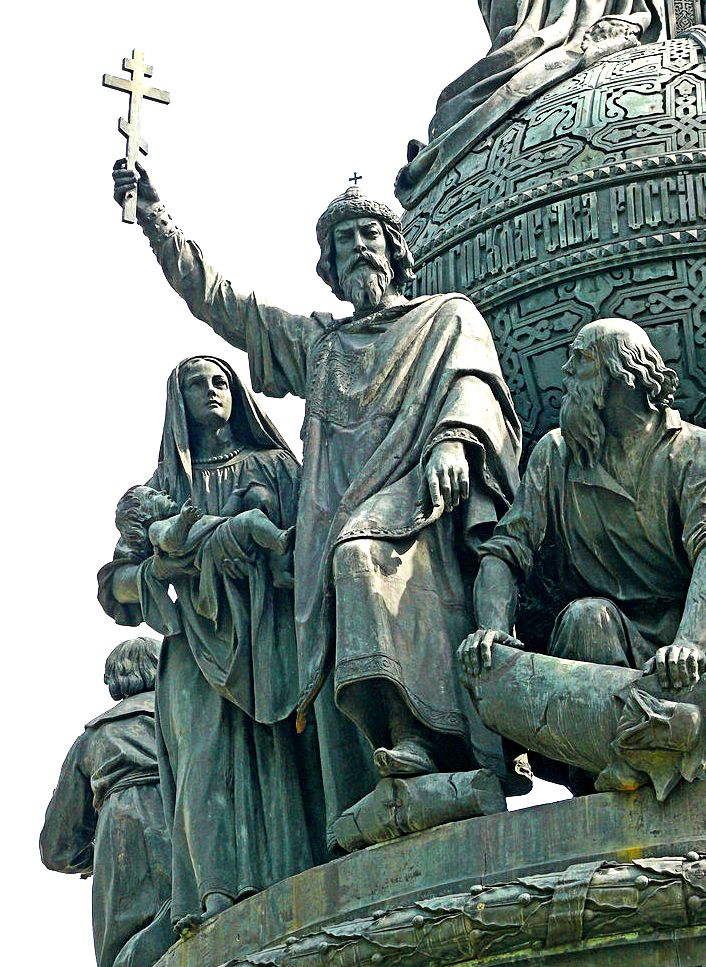
Monument to Vladimir the Great – Kiev
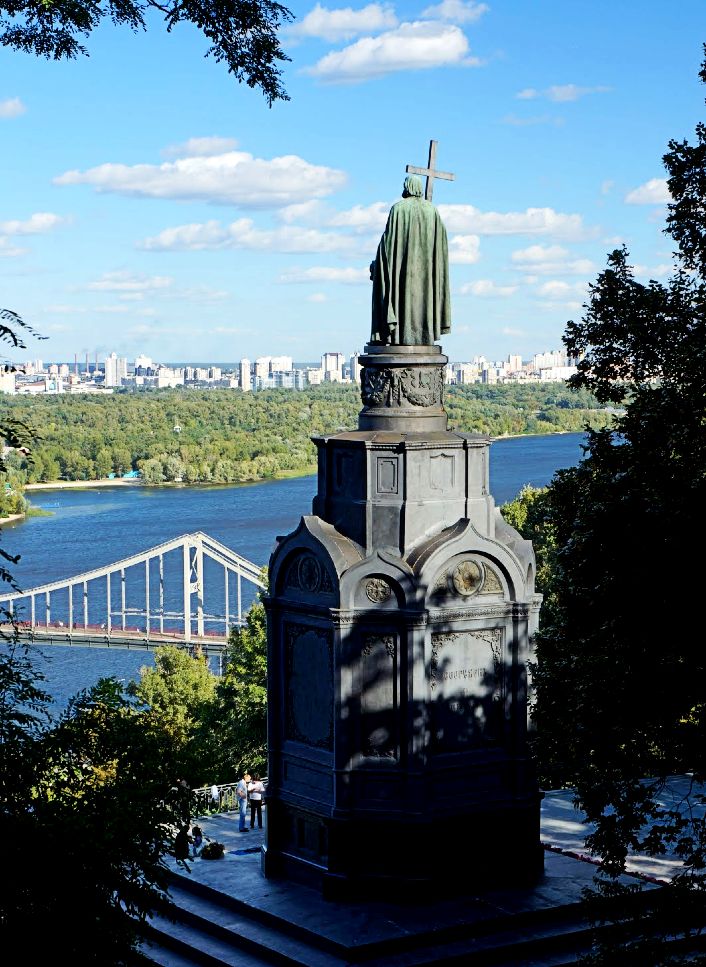
A Marriage Proposal
Vladimir saw an opportunity to increase his influence and consolidate his power in the region when the Byzantine emperor, Basil, requested his help to put down a rebellion in Constantinople. Vladimir was only too glad to help, provided he could marry Basil’s sister, the beautiful Greek Princess Anna. It was not a bad deal, and Basil agreed.
The only problem with this arrangement was that the respective emperors forgot to inform Princess Anna about this decision! (Men. They’re all the same.) After Vladimir provided 6,000 Russian soldiers to help Basil put down the rebellion, the bill came due, and Vladimir was ready to tie the knot.
But by then, Anna – who found out by text message that she was scheduled for a royal wedding (just kidding) – adamantly refused to marry Vladimir. Given that kind of treatment, I can’t say I blame her, but her reason for refusing was both interesting and principled: apparently, she was horrified at the thought of marrying an unbaptized barbarian (I told you this was a soap opera.)
A curious thing then happened. Vladimir asked Basil to send a delegation of Orthodox priests – along with his sister Anna – to Kiev so that the Slavic prince could be baptized and married in the Christian faith. Funny how that is.
So, in effect, the conversion of an entire large empire happened because a good Christian woman refused to accept an arrangement that would have compromised her own faith. How different the world would be if Christian women everywhere stood so strong! But there is even more to this story.
The Grace Behind the Throne
We shouldn’t look at Vladimir merely as an opportunist who used a sacred reality like baptism to further his political ambitions. Historians also believe he was a sincere religious seeker who actively sought to adopt a religion that would provide his people with cultural stability, economic prosperity, and also a pathway to eternal salvation. He may have been a pagan, but he seems also to have been a shrewd and honest man.
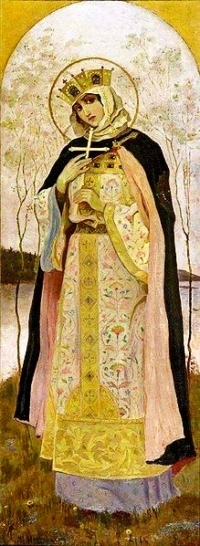 The real force of grace behind Vladimir’s throne, however, was his grandmother, St. Olga, who is a canonized saint in the Eastern Churches. In a visit to the Byzantine capital sometime in the 950s, she was baptized by the Patriarch of Constantinople and was given the Christian name of Helena, reminiscent of Constantine’s mother. (It was Constantine who had effectively legalized Christianity in the Roman Empire with his own conversion in the 4th century.)
The real force of grace behind Vladimir’s throne, however, was his grandmother, St. Olga, who is a canonized saint in the Eastern Churches. In a visit to the Byzantine capital sometime in the 950s, she was baptized by the Patriarch of Constantinople and was given the Christian name of Helena, reminiscent of Constantine’s mother. (It was Constantine who had effectively legalized Christianity in the Roman Empire with his own conversion in the 4th century.)
Queen Olga returned to her territory and followed the same path as Helena in converting an empire. Although she had no luck whatsoever converting her own son, Sviatoslav, she did get him agree to cease persecuting Christians in his territory. That in itself was a major victory on the order of Constantine’s reform.
Olga had greater influence, however, over her grandson Vladimir both in his early education and also later by being the example for his conversion to Christianity. Olga died in 969 when Vladimir was young, but he always retained a deep affection for her. Once again, it seems a medieval princess exerted a decisive impact on the fate of world history.
Fr. William Slattery in his book, Heroism and Genius, describes Olga’s influence as part of a distinct pattern of that age: “the quiet but powerful feminine role in the conversion of Europe” (54). He mentions other queens and abbesses like Bertha of Kent, Heloise of France, Margaret of Scotland, Blanche of Castile and many other amazing women who literally changed the world by their fidelity to Christ and His Church.
Now we come to the coup de grâce.
The Epic Delegation
When Vladimir was considering the specific religion to adopt, he did a careful study of all the monotheistic religions. Islam offered no attraction to him because it forbade alcohol (that really was his reason!). With a warrior’s mindset, he also discounted Judaism because he thought their religion was weak. After all, they let the Romans destroy their Temple (that, too, was actually his reason!)
Interestingly, as he looked to the West, the Latin Rite Church did not attract him either because he thought their churches were ugly. (Imagine! He’d be in for quite a surprise today.) Remember, this was the period before all the great Gothic cathedrals were built (from 1150-1300 AD).
Based on the memory of his saintly grandmother, Vladimir finally sent a delegation to Constantinople to inquire about the Christian faith as it was manifested in the Eastern Churches. They made a visit to the Church of Hagia Sophia (Holy Wisdom), which was the Patriarch’s cathedral, and this was their stunned reaction, which they reported to Vladimir upon their return:
Then we went to Greece, and the Greeks led us to the edifices where they worship their God, and we knew not whether we were in heaven or on earth. For on earth there is no such splendor or such beauty, and we are at a loss how to describe it. We only know that God dwells there among men, and their service is fairer than the ceremonies of other nations. For we cannot forget that beauty…’’
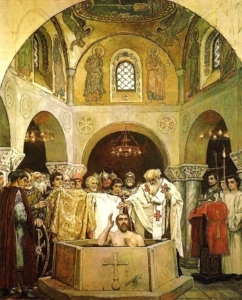 The icons and holy art, the atmosphere of mystery, the incense and bells, the sacred chanting and prayer: Vladimir’s envoys were overwhelmed by the sublime beauty of the Eastern churches and the liturgy they witnessed there.
The icons and holy art, the atmosphere of mystery, the incense and bells, the sacred chanting and prayer: Vladimir’s envoys were overwhelmed by the sublime beauty of the Eastern churches and the liturgy they witnessed there.
They had opened a sacred window and, for a brief moment, they saw the face of Christ looking back at them from Heaven. Amazing.
Vladimir was converted. His people were converted and millions of souls since then have been brought into the kingdom of Heaven because of that one solitary visit in search of the greatest expression of God’s goodness and beauty on earth.
The Need for Ongoing Conversion
When we say that a whole nation was converted, we are not claiming that every individual citizen embraced the faith instantly or that the conversion was necessarily deep-seated, as such. Some of these mass conversions throughout history were sociological phenomena as much as they were spiritual.
Vladimir’s conversion story, for example, doesn’t have a fairytale ending. While he himself was a sincere convert, perhaps he wasn’t quite as effective at passing that same faith down to his children. Vladimir had five baptized sons. After his death, there ensued a terrible civil war in which his fourth son, known to history as Svyatopolk the Accursed (which tells you all you need to know about him), killed his three older brothers to take control of the empire. Then his youngest son, Yaroslav, went to war against the Accursed one and eventually took over the Empire for himself.
Yaroslav tried to ensure a peaceful process of royal succession for after his death, but his own sons ignored his decree and carved up their ancestral empire with the long knives of political rivalry. The fragmented Empire, weakened by so much sustained infighting, was no match for the Mongol invasion in the 13th century, which effectively ended the Kievan Rus’ as a single ethnic-political unity.
The individual nation states of Russia, Belarus, and Ukraine are the long-term result of so much division. It’s true that paganism always dies hard both in nations and in individual souls, and the byzantine politics of Kievan Rus’ are just one of many historical examples.
Yet, what remains of the conversion of Vladimir the Great is not the memory of his wretched progeny. It is the door he opened to the light of faith that penetrated the last the last bit of the darkness that had enveloped Europe after the fall of the Roman Empire.
———-
[Note: This article is a reproduction of the Sacred Windows Email Newsletter of 11/20/22, so it does not end with the regular Soul Work section. Please visit our Newsletter Archives.]
Images via Pixabay (Feature), Britannica (map), and Wikimedia Commons: St. Olga, Moscow monument, Kiev Monument, Baptism.
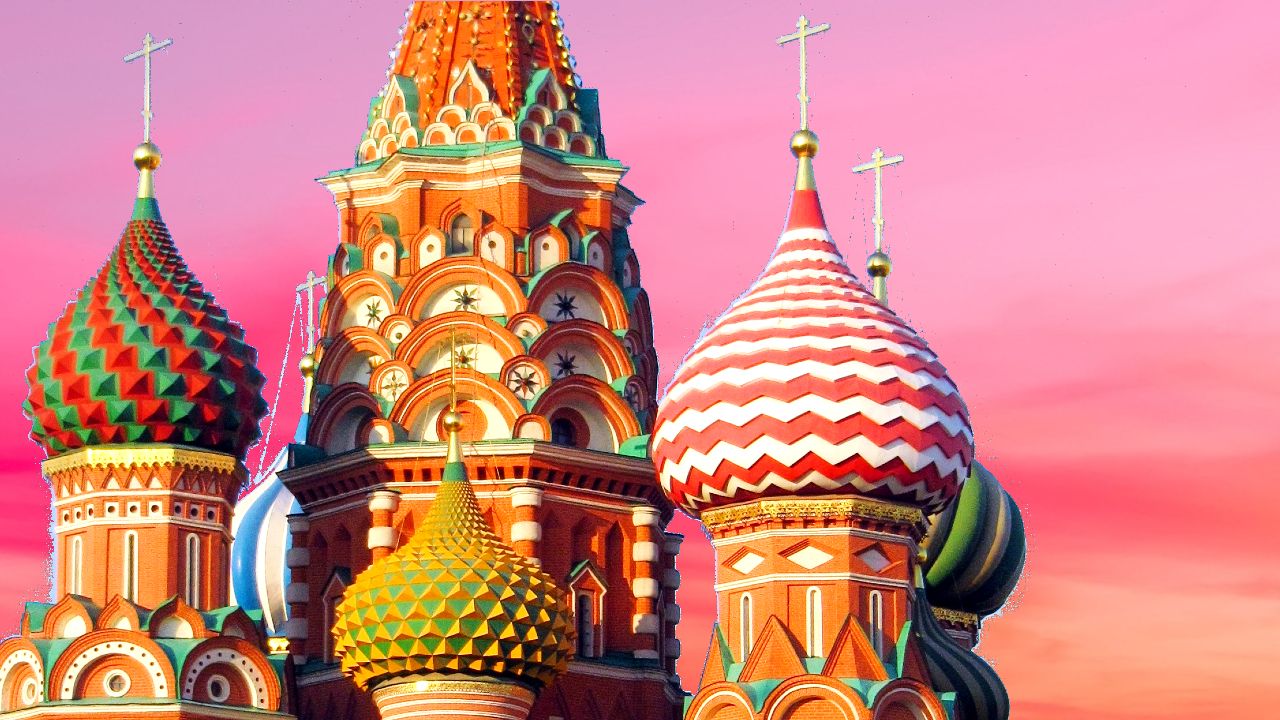
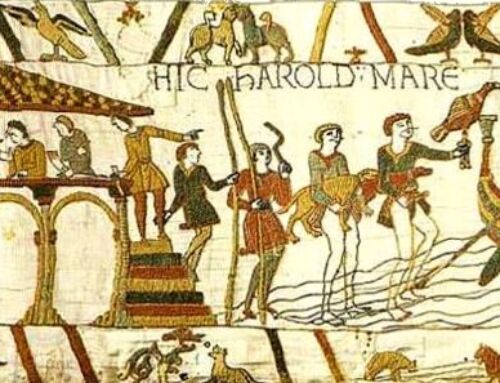


Leave A Comment